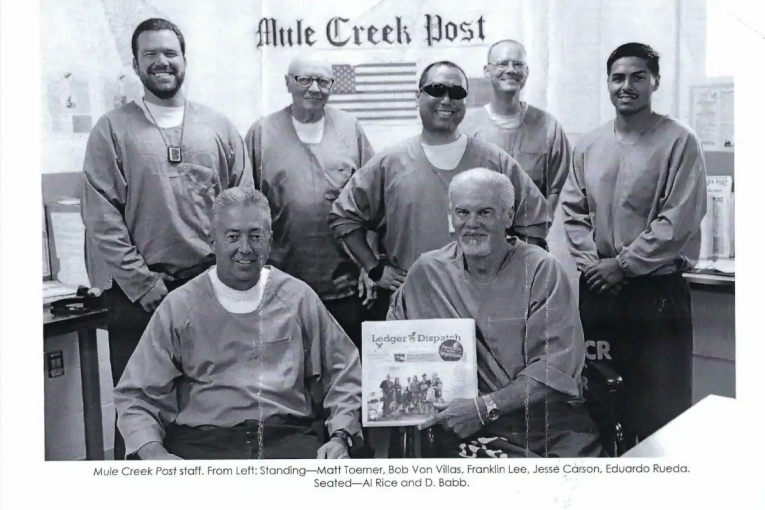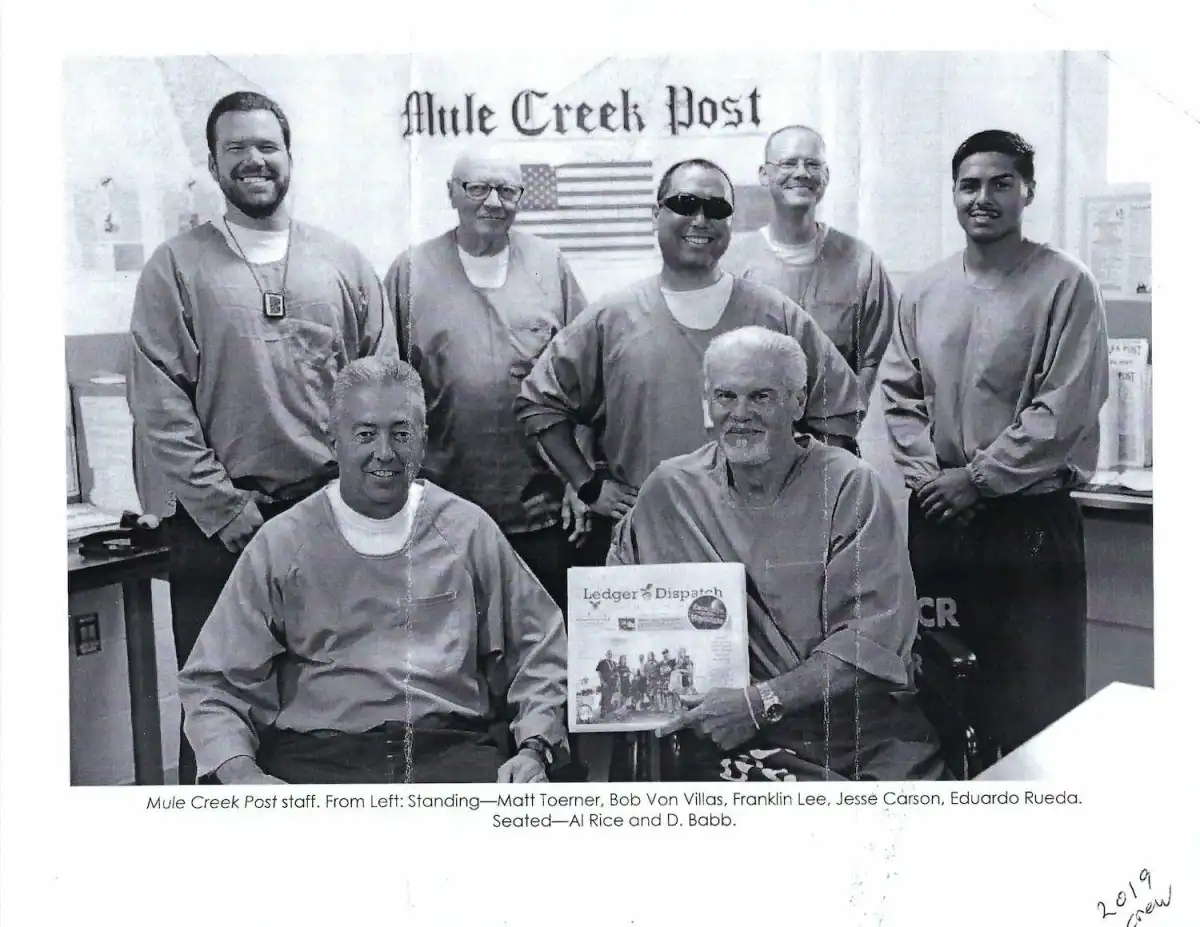

by David “Razor” Babb
A prison newspaper is a tricky thing. There are so many variables and intricacies involved in getting it up and running, and then keeping it operating. Anyone attempting such a ridiculously foolhardy endeavor might easily be declared clinically insane.
The Mule Creek Post, a prisoner-written and produced newspaper out of Mule Creek State Prison in Ione, California, ran its first issue on Jan. 1, 2018. Forty-four issues later, the eight-man crew is proud of never having missed a monthly issue in spite of lockdowns, a suspension and the pandemic.
We are an eclectic crew. Most of us are serving life sentences and have been down for decades. Few had any journalism experience going in, some had varying degrees of writing expertise, and others were just interested because it seemed like an unusual and creative endeavor. Most thought it couldn’t be done.
In late 2017, on a concrete yard table with papers scattered by the strong winds that swirl in the foothills of the Sierra Nevada mountains, schemes were hatched and stories assigned. In December, a two-page, typed, cut-and-pasted proof sample copy was presented to the prison administration during a meeting. Acting Associate Warden Erik Pedersen was enthusiastic and supportive, and with his recommendation and the warden’s subsequent approval, the Mule Creek Post was born.
“It’s never easy, but it’s worth it,” said production editor Jesse Carson. The 16-page monthly can take anywhere from a couple of weeks to over a month to  compile the stories, type and edit, wrangle the graphics and photos, lay the pages out, proofread and review.
compile the stories, type and edit, wrangle the graphics and photos, lay the pages out, proofread and review.
The Post started out in newsletter format, but after a visit from California Department of Corrections and Rehabilitation Public Information Officer Krissi Khokhobashvili in May 2018, our supervising editor Stella Russell contacted Jack Mitchell, the publisher of the Amador County Ledger Dispatch to see if he might be interested in helping out. The very next month, Mitchell began printing the Post in a newspaper format.
Joan Parkin, Feather River College’s professor emerita, is a supporter, adviser, contributing columnist and executive director of the paper’s nonprofit affiliate, Incarcerated Allied Media (IAM).
“Some people say the paper looks better than some of the newspapers on the outside,” Spanish translator and editorial assistant Angel Castillo said. “When I arrived at Mule Creek, I was surprised they had their own paper just like San Quentin.”
Castillo said he got involved when a friend told him they were looking for someone to translate stories into Spanish.
Comparisons to the San Quentin News are routine, but the publications are different. The San Quentin News benefits from their Marin County location and has numerous high-profile supporters, a volunteer army of more than 40, fully engaged and active fundraising, a supportive administration and seasoned journalism advisers.
By contrast, The Mule Creek Post runs out of a vacant education room in one of the housing units. We scrounge for paper and pens, rarely see anyone other than other inmates, and editors and reporters spend their own money on stamps to mail the paper out.
“I just got my stimulus check, most of it has gone toward buying paper, ribbons, envelopes and stamps,” said copy editor Al Rice, adding that he had been working in the kitchen while also working on the paper for a year before he was officially assigned to the newsroom.
“When they passed through the chow line and hollered through the tray slot that I got the job, I about dropped a whole pan of beans,” Rice recalled. “The chow hall boss offered to double my pay —a nickel an hour more — if I’d stay.”
Rice said he hasn’t regretted his decision to leave. “I love this job. It’s the best prison job I’ve ever had.”
The newspaper has garnered much attention and compliments from readers beyond prison walls, too.
Currently, it is incrementally distributed to five other prisons, but we have a goal of reaching statewide distribution to all 35 California institutions soon.
The Mule Creek Post is also gradually expanding its activities.
In February 2020, just before the pandemic shut down the prisons, Post editors collaborated with Parkin, Feather River College and the prison to arrange an education roundtable featuring the Phi Theta Kappa honor society. It was a rousing success.
At the roundtable, Parkin debuted her anthology of prisoner writings, “Perspectives from the Cell Block.” The book was digitally converted, edited and formatted by Mule Creek Post editors and published through their contact, LWL Publishing.
“When I met the guys at the Mule Creek Post, I couldn’t believe what they were doing,” Parkin said. “The paper they produce is the highest quality. I was very impressed. They were conducting videotaped interviews, roundtables and group discussions for institutional TV viewing. It was amazing.”
Parkin went on to organize the Social Justice Prisoners Journalism Club at Feather River College, providing interns for the paper. Those interns have gone on to serve on the board of Incarcerated Allied Media. A recent connection with David Greenwald, a local podcaster with more than 200,000 listeners and the founder of Davisvanguard.org, has also pushed our work as a non-profit forward as he has been able to help write grants.
“We’ve got our hopes up and big plans in the works,” said financial reporter Bob Von Villas. “If those grants go through, not only will we finally get statewide distribution, we may even get some office supplies.”
David “Razor” Babb is the founding editor-in-chief of “The Mule Creek Post,” a newspaper published out of Mule Creek State Prison in California and a 2008-2009 winner of the PEN Prison Writing Award in the essay category. He is also the author of numerous books including “Icicle Bill,” “Goodbye Natalie,” and “Last Lockdown.”
Originally published by the Prison Journalism Project

Interesting article. Would have been nice to have something like this early on to explain what these articles were about.
Is that number verified by science?